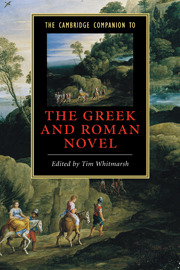9 - Time
from Part II - The world of the novel
Published online by Cambridge University Press: 28 June 2008
Summary
In his monumental work Time and Narrative, Paul Ricoeur distinguishes 'tales about time', like The Magic Mountain or Remembrance of Things Past, from 'tales of time', which all narratives are by virtue of the fact that they are read and unfold in time. Few would put the ancient novels into the former category; they are not explicitly about time in an abstract sense, that is, they rarely discuss time in a philosophical or reflective fashion. Much scholarship has instead focused on how the novelists manage their 'tales of time' - for example how Heliodorus manipulates the temporal order of events in his narrative or how Apuleius orchestrates a subtle shifting between his narrator Lucius' past and present temporal point of view. We can even speak of the tempo or pace of the novels when we examine the way in which they vary the relationship between narrating time (measured in words and pages) and narrated time (measured in days, hours, years). Such narratological work on the novelists' deployment of time has produced valuable insight into their story-telling technique, and I refer to it throughout this chapter. But there are other ways of talking about the novels' conception of time. Every novel conveys a certain temporal feeling to its readers - what Ricoeur calls 'the fictive experience of time' - not only through explicit commentary and rendering of narrative time, but also via thematic content, employment of temporal reference and the depiction of its characters' experience of time. One influential attempt to describe novelistic genres on the basis of their represention of such temporal (and spatial) experience, or chronotope, was proposed by the literary theorist Mikhail Bakhtin.
- Type
- Chapter
- Information
- The Cambridge Companion to the Greek and Roman Novel , pp. 145 - 161Publisher: Cambridge University PressPrint publication year: 2008
- 3
- Cited by

